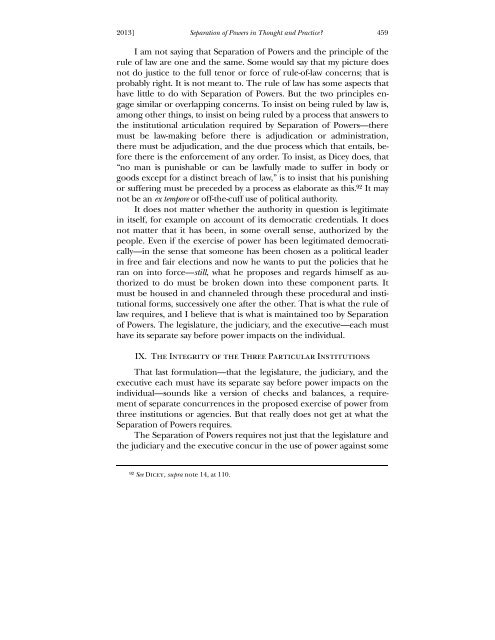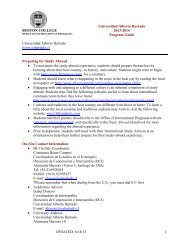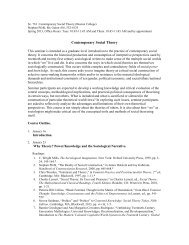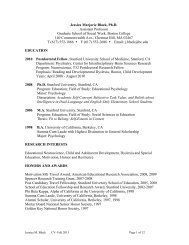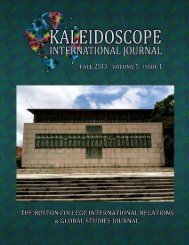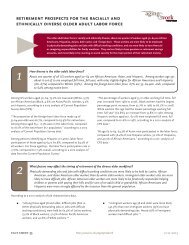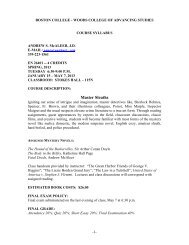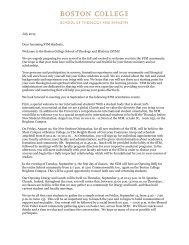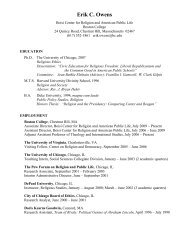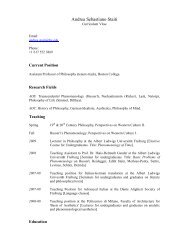separation of powers in thought and practice? - Boston College
separation of powers in thought and practice? - Boston College
separation of powers in thought and practice? - Boston College
Create successful ePaper yourself
Turn your PDF publications into a flip-book with our unique Google optimized e-Paper software.
2013] Separation <strong>of</strong> Powers <strong>in</strong> Thought <strong>and</strong> Practice? 459<br />
I am not say<strong>in</strong>g that Separation <strong>of</strong> Powers <strong>and</strong> the pr<strong>in</strong>ciple <strong>of</strong> the<br />
rule <strong>of</strong> law are one <strong>and</strong> the same. Some would say that my picture does<br />
not do justice to the full tenor or force <strong>of</strong> rule-<strong>of</strong>-law concerns; that is<br />
probably right. It is not meant to. The rule <strong>of</strong> law has some aspects that<br />
have little to do with Separation <strong>of</strong> Powers. But the two pr<strong>in</strong>ciples engage<br />
similar or overlapp<strong>in</strong>g concerns. To <strong>in</strong>sist on be<strong>in</strong>g ruled by law is,<br />
among other th<strong>in</strong>gs, to <strong>in</strong>sist on be<strong>in</strong>g ruled by a process that answers to<br />
the <strong>in</strong>stitutional articulation required by Separation <strong>of</strong> Powers—there<br />
must be law-mak<strong>in</strong>g before there is adjudication or adm<strong>in</strong>istration,<br />
there must be adjudication, <strong>and</strong> the due process which that entails, before<br />
there is the enforcement <strong>of</strong> any order. To <strong>in</strong>sist, as Dicey does, that<br />
“no man is punishable or can be lawfully made to suffer <strong>in</strong> body or<br />
goods except for a dist<strong>in</strong>ct breach <strong>of</strong> law,” is to <strong>in</strong>sist that his punish<strong>in</strong>g<br />
or suffer<strong>in</strong>g must be preceded by a process as elaborate as this.92 It may<br />
not be an ex tempore or <strong>of</strong>f-the-cuff use <strong>of</strong> political authority.<br />
It does not matter whether the authority <strong>in</strong> question is legitimate<br />
<strong>in</strong> itself, for example on account <strong>of</strong> its democratic credentials. It does<br />
not matter that it has been, <strong>in</strong> some overall sense, authorized by the<br />
people. Even if the exercise <strong>of</strong> power has been legitimated democratically—<strong>in</strong><br />
the sense that someone has been chosen as a political leader<br />
<strong>in</strong> free <strong>and</strong> fair elections <strong>and</strong> now he wants to put the policies that he<br />
ran on <strong>in</strong>to force—still, what he proposes <strong>and</strong> regards himself as authorized<br />
to do must be broken down <strong>in</strong>to these component parts. It<br />
must be housed <strong>in</strong> <strong>and</strong> channeled through these procedural <strong>and</strong> <strong>in</strong>stitutional<br />
forms, successively one after the other. That is what the rule <strong>of</strong><br />
law requires, <strong>and</strong> I believe that is what is ma<strong>in</strong>ta<strong>in</strong>ed too by Separation<br />
<strong>of</strong> Powers. The legislature, the judiciary, <strong>and</strong> the executive—each must<br />
have its separate say before power impacts on the <strong>in</strong>dividual.<br />
IX. The Integrity <strong>of</strong> the Three Particular Institutions<br />
That last formulation—that the legislature, the judiciary, <strong>and</strong> the<br />
executive each must have its separate say before power impacts on the<br />
<strong>in</strong>dividual—sounds like a version <strong>of</strong> checks <strong>and</strong> balances, a requirement<br />
<strong>of</strong> separate concurrences <strong>in</strong> the proposed exercise <strong>of</strong> power from<br />
three <strong>in</strong>stitutions or agencies. But that really does not get at what the<br />
Separation <strong>of</strong> Powers requires.<br />
The Separation <strong>of</strong> Powers requires not just that the legislature <strong>and</strong><br />
the judiciary <strong>and</strong> the executive concur <strong>in</strong> the use <strong>of</strong> power aga<strong>in</strong>st some<br />
92 See Dicey, supra note 14, at 110.


